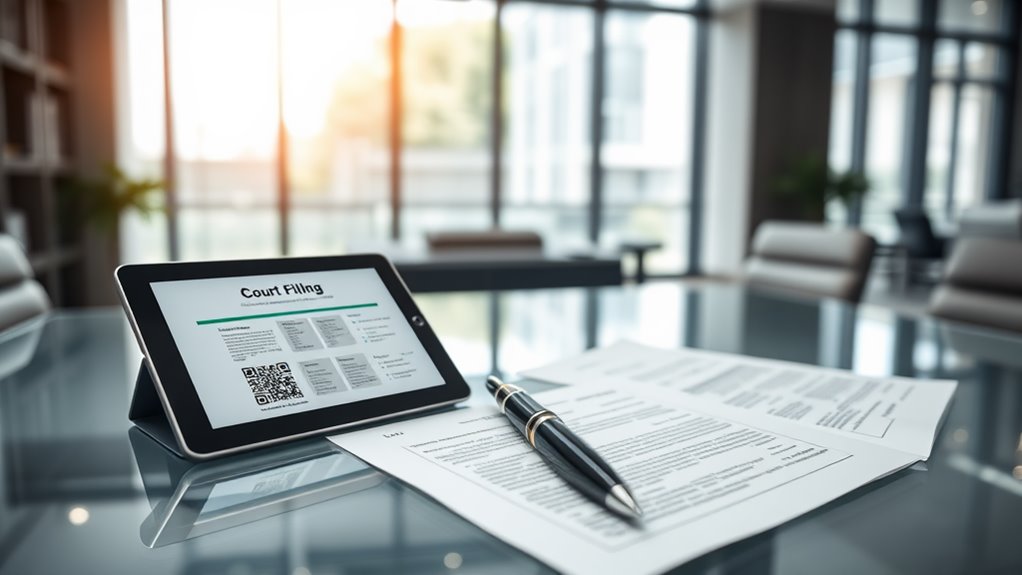To file a lawsuit complaint in 2025, one must begin by understanding the basics of a complaint, including identifying the proper jurisdiction. It is crucial to gather necessary documentation that supports the claims and therefore draft a coherent complaint. Filing requires attention to detail, including knowing filing fees and selecting the appropriate court. Finally, serving the defendant and preparing for discovery is essential for case progression. Further details can provide deeper insights into each of these steps.
Key Takeaways
- Begin by identifying the proper jurisdiction for your lawsuit, considering both subject matter and personal jurisdiction to ensure a successful filing.
- Gather necessary documentation, including contracts and correspondence, to support your claims and organize them systematically for easy access.
- Draft your complaint carefully, including a caption, jurisdiction statement, factual background, and specific legal grounds for your claims.
- Select the appropriate court for your case and prepare the necessary filing documents, adhering to specific formatting requirements and checking for filing fees.
- Serve the defendant using an accepted method, such as personal service or certified mail, and respond promptly to any answer they provide.
Understanding the Basics of a Lawsuit Complaint

While filing a lawsuit complaint may seem challenging, understanding its fundamental components is essential for any individual or entity seeking legal recourse. A complaint typically begins with a caption, identifying the parties involved, followed by a clear statement of jurisdiction. The body of the document should articulate the factual background, outlining the events that led to the dispute. Key lawsuit terminology, such as “plaintiff” and “defendant,” must be used accurately to avoid confusion. Additionally, the complaint format requires a concise legal basis for the claims made, including applicable laws and sought remedies. By adhering to these elements, individuals can effectively communicate their grievances and establish a solid foundation for their case in the legal system. Engaging private investigators can provide essential support in gathering evidence to strengthen the claims made in the complaint.
Identifying the Proper Jurisdiction
Determining the proper jurisdiction is essential for the successful filing of a lawsuit complaint, as it dictates where a case can be heard and which laws will apply. Jurisdiction encompasses both subject matter and personal jurisdiction, influencing venue selection considerably. A party must identify the most appropriate court based on the nature of the claim and the parties involved. Jurisdictional challenges may arise, potentially delaying the process or resulting in the dismissal of the case if filed in the wrong venue. Understanding these complexities guarantees that individuals can effectively navigate the legal landscape. Proper jurisdiction not only enhances the likelihood of a favorable outcome but also fosters a sense of confidence in the legal proceedings ahead. Additionally, attorneys often collaborate with private investigators to gather critical evidence that may impact jurisdictional determinations.
Gathering Necessary Documentation
Gathering necessary documentation is a critical step in the lawsuit filing process. Individuals must focus on gathering evidence that supports their claims, as this will be essential in establishing a strong case. This includes collecting relevant contracts, emails, receipts, and any other pertinent materials. Organizing documents in a coherent manner is equally important, as it facilitates easier access and review during the legal proceedings. Creating a systematic filing system—such as digital folders or physical binders—can aid in maintaining clarity. Additionally, maintaining a record of interactions related to the case may prove beneficial. Adequate preparation through meticulous documentation allows individuals to present their case effectively, ensuring that all essential information is readily available when needed. Furthermore, seeking assistance from professional investigators can provide crucial evidence that strengthens the case.
Drafting Your Complaint

Drafting a complaint requires careful attention to its key components, ensuring that all necessary information is clearly presented. Common mistakes in this process can undermine the effectiveness of the complaint and may lead to dismissal. Understanding both the essential elements and potential pitfalls is vital for successful litigation. Additionally, seeking expert investigations can provide crucial evidence to support your claims in court.
Key Components Explained
A well-structured complaint is essential for initiating a lawsuit, as it lays the foundation for the claims being presented. The key components of a complaint include the caption, which identifies the parties involved, and the statement of jurisdiction, establishing the court’s authority. The factual allegations must be clearly articulated, employing appropriate legal terminology to convey the events leading to the dispute. Additionally, the complaint format should include the claims for relief, detailing the specific legal grounds for the lawsuit. Each component must be precise and coherent, ensuring that the reader comprehends the nature of the case. Ultimately, a well-crafted complaint serves not only as a legal document but also as a narrative that invites understanding and engagement.
Common Mistakes to Avoid
While drafting a complaint, many individuals make critical errors that can jeopardize their case. Common pitfalls include failing to adhere to court formatting requirements and neglecting to include essential facts or legal claims. Procedural errors, such as missing deadlines for filing or not serving the complaint properly, can also undermine a lawsuit’s viability. Additionally, overly vague language or excessive detail can confuse the reader and detract from the main arguments. It is crucial to guarantee that the complaint articulates the claims clearly and succinctly, providing sufficient detail to support them. By avoiding these mistakes, individuals can enhance their chances of a successful outcome in court, ensuring their grievances are heard effectively and without unnecessary complications.
Filing the Complaint With the Court

Filing the complaint with the court requires careful consideration of several factors. Selecting the appropriate court is essential, as jurisdiction can greatly impact the case outcome. Additionally, parties must prepare the necessary filing documents and be aware of associated filing fees and costs. Understanding background checks can also be beneficial, particularly if the lawsuit pertains to employment or tenant-related issues.
Choosing the Right Court
Selecting the appropriate court is essential for the successful filing of a lawsuit complaint, as jurisdictional requirements can greatly impact the case’s outcome. Venue selection involves determining the most suitable court based on factors such as the location of the parties involved and the nature of the dispute. Understanding court hierarchy is also critical; cases must be filed in courts that possess the authority to hear them. For instance, small claims matters typically belong in lower courts, while more complex issues may necessitate filing in higher courts. Proper venue selection not only adheres to legal standards but also sets the stage for a more favorable resolution, ensuring that the lawsuit is positioned effectively within the judicial system.
Required Filing Documents
After determining the appropriate court, the next step involves preparing the necessary filing documents to initiate the lawsuit. The primary document required is the complaint, which must adhere to the specific complaint format mandated by the court. This format typically includes the case caption, jurisdiction statement, and a concise statement of the claim, among other elements. Additionally, plaintiffs should familiarize themselves with the filing procedures, as these vary by jurisdiction and may include specific guidelines for formatting and submitting documents. It is essential to guarantee that all required documents are complete and accurate to avoid delays in the lawsuit process. Proper preparation sets a solid foundation for the legal proceedings ahead.
Filing Fees and Costs
When initiating a lawsuit, understanding the associated filing fees and costs is essential, as these expenses can vary considerably by jurisdiction and court level. Filing fees typically reflect the nature of the case and the court in which the complaint is filed. For instance, federal courts often impose higher fees than state courts. Additionally, one must account for court costs, which may include expenses for serving documents, obtaining copies, and other administrative services. It is advisable to consult the specific court’s fee schedule and be prepared for potential additional costs that might arise throughout the litigation process. Being informed about these financial obligations guarantees that plaintiffs can adequately prepare for their legal journey.
Serving the Defendant
How does one effectively serve the defendant in a lawsuit? Proper service methods are vital for delivering defendant notice and ensuring the legal process proceeds smoothly. Here are various methods to take into account:
- Personal Service: Directly handing the documents to the defendant.
- Substituted Service: Delivering documents to someone of suitable age at the defendant’s residence.
- Certified Mail: Sending the documents via certified mail, requiring the defendant’s signature upon receipt.
- Electronic Service: Utilizing email or other electronic means, if permitted by the court.
Each method has specific requirements and legal implications. It is essential to follow the local rules regarding service to establish jurisdiction and uphold the integrity of the lawsuit. Additionally, hiring a private investigator can assist in effective background checks to locate a defendant who may be difficult to serve.
Responding to the Defendant’s Answer
Although the defendant’s answer provides an opportunity for the opposing party to clarify and respond to the allegations, it is vital for the plaintiff to carefully assess the contents of the response. The plaintiff should develop effective responding strategies to address any new claims or defenses presented by the defendant. This response must directly engage the answer implications, determining which assertions can be accepted, rejected, or need further clarification. A well-crafted reply not only strengthens the plaintiff’s position but also sets the stage for subsequent proceedings. Timeliness is important, as failure to respond adequately may result in a loss of rights or claims. Therefore, careful consideration of the defendant’s answer is paramount in shaping the trajectory of the case. Additionally, understanding the legal framework and regulations governing the case can provide valuable context for formulating a strategic response.
Preparing for Discovery
Preparing for discovery requires meticulous planning and organization. This phase is critical for effective case management and requires the careful handling of discovery requests and document production. To guarantee a successful process, parties should consider the following:
- Identify relevant documents and evidence early.
- Develop a clear timeline for responses to discovery requests.
- Organize documents systematically for easy access.
- Communicate openly with opposing counsel to clarify expectations. Additionally, collecting comprehensive evidence can significantly strengthen your position during discovery.
Moving Forward With Your Case
Advancing a case requires a strategic approach that builds on the groundwork laid during discovery. Legal representation plays an essential role in this phase, as attorneys refine case strategy based on the evidence gathered. It is important to evaluate the strengths and weaknesses of the case, ensuring that arguments are compelling and well-supported. Effective communication with clients fosters trust and collaboration, allowing for adjustments in strategy as new information emerges. Additionally, anticipating potential challenges and preparing counterarguments can greatly enhance the likelihood of success. Ultimately, a methodical and proactive approach, supported by competent legal representation, is critical for maneuvering the complexities of litigation and moving forward confidently with the case. Engaging private investigators for attorneys can provide specialized legal support to enhance the case construction.
Frequently Asked Questions
What Are Common Reasons for a Lawsuit to Be Dismissed?
Common reasons for lawsuit dismissal include insufficient evidence to support claims and procedural errors that violate court rules. These factors can undermine a case’s viability, leading to unfavorable outcomes for the involved parties.
How Much Does It Cost to File a Lawsuit Complaint?
The cost of filing a lawsuit complaint typically includes filing fees and court costs, which can vary considerably depending on jurisdiction and case type, leading to potential expenses ranging from hundreds to thousands of dollars.
Can I Represent Myself in a Lawsuit?
Self-representation in a lawsuit poses significant challenges, including procedural complexities and potential pitfalls. Seeking legal advice can provide essential benefits, enhancing understanding of the law and improving the likelihood of a favorable outcome in litigation.
What Happens if the Defendant Doesn’T Respond?
If the defendant does not respond, the court may issue a default judgment. This judgment carries significant legal consequences, potentially awarding the plaintiff the relief sought, while the defendant forfeits the opportunity to present their defense.
How Long Does the Entire Lawsuit Process Typically Take?
The litigation timeline varies considerably, typically ranging from several months to years. Factors influencing duration include court procedures, complexity of the case, and responsiveness of parties involved, resulting in unpredictable timelines for resolution.
Conclusion
In summary, filing a lawsuit complaint in 2025 requires a clear understanding of legal procedures and meticulous preparation. By identifying the appropriate jurisdiction, gathering necessary documentation, and drafting a precise complaint, individuals can effectively initiate their case. Proper filing and serving of the complaint, followed by managing responses and engaging in discovery, are essential steps in advancing the lawsuit. Adhering to these guidelines will facilitate a more organized and efficient legal process.





